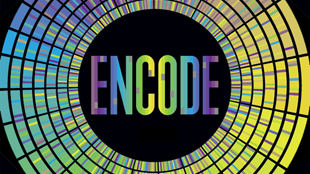
Yet, very little of Human genome truly is non-functional...
ENCODE is an international project,
the ENCylopedia Of DNA Elements,
and what each element does.
total Human genome, but it did not tell us how they are controlled, used, or code for a living human?
Thus what does the other 98% of human DNA's base pairs do?.
that as much as 80% of this non-coding genome makes molecular switches that instruct the coding
genes when to turn-on and turn-off, or how much protein to make in different cells and at different
points in our lifetimes. These non-coding switches can make an uncommitted cell in an embryo become
a neuron or a pancreatic cell to produce insulin.
back
The ENCODE project now knows where each element is, what binds to them, what their associations
with other elements are. They've learned what they can do, which includes:
1. many elements (8.5%) contain docking sites where proteins bind & effect expression of
near & far genes;
2. some are transcribed into RNAs (that don't code for proteins);
some are Riboswitches that may regulate gene expression in response to cell energy levels
3. some effect how DNA is folded and packaged;
4. SNPs (single nucleotide polymorphisms) within protein coding regions = mutations, but ENCODE
found but as much as 60% of SNPs lie within non-coding, ,but functional DNA regions,
especially in promoter and enhancer regionss, that obviously can effect disease risk.
5 SNPs have been linked to Crohn's disease via transcription factors (GATA2).
[junk no more*] thus some 20% of the non-coding genome may still be junk.
These results suggest we need to redefine what a "gene" is...
Results to date were published in 30 separate papers on Sep 05, 2012 in several journals including:
Nature, Genome Biology, Science, Cell and Genome Research.
"By carefully piecing together a simply staggering variety of data, we’ve shown that the human genome is simply alive with switches, turning our genes on and off and controlling when and where proteins are produced. ENCODE [Encyclopedia of DNA Elements] has taken our knowledge of the genome to the next level, and all of that knowledge is being shared openly".
—European Bioinformatics Institute’s Ewan Birney, lead analysis coordinator for the ENCODE project, describing its impact in a National Institutes of Health news bulletin on the day the data was published (Sept. 5, 2012)
back